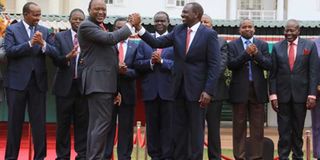Politics of ‘Hakuna Deni’ bring out the fraud in UhuRuto pact

President Uhuru Kenyatta, his Deputy William Ruto and Jubilee party officials at State House, Nairobi. Kenya is slowly but certainly losing the race of progress in the region to nations that are better organised.
PHOTO | FILE | NATION MEDIA GROUP
What you need to know:
Any favour granted or any debt owed remains an individual matter.
The alliance helped to make Mr Kenyatta and Mr Ruto, respectively, President and Deputy President of Kenya and not of their respective communities.
What Kenya needs is a genuine national dialogue, not temporary pacts delivered out of short-sighted political convenience.
If one ever needed proof that Kikuyu-Kalenjin ethnic relations remain a ticking time bomb, that was inadvertently provided by the Hatuna Deni (We Have no Debt) music video that is spreading like bushfire.
The song purports to represent general Kikuyu rejection of the notion that the community owes Deputy President William Ruto for the backing by him and his Kalenjin peoples of President Uhuru Kenyatta’s successful 2013 and 2107 campaigns.
That Mr Ruto has found it fit to publicly respond to the ‘no debt’ mantra is, itself, an indication that the narrative is being taken seriously.
The Jubilee Party and ‘UhuRuto’ power-sharing and succession pact was based on the fiction that it united their warring communities and finally restored peace in the perpetual battlefields of the Rift Valley.
The presumption that Mr Kenyatta will reciprocate and throw his weight behind Mr Ruto’s 2022 presidential campaign can no longer be taken for granted.
Mr Kenyatta may intend to honour his promise but there is no guarantee that he will rally the Kikuyu to a man behind Mr Ruto in the way the latter’s Kalenjin did for him.
CONTROVERSIAL SONG
And that is where the controversial song comes in. Even if President Kenyatta has nothing to do with it, the recording is obviously sponsored by a wealthy and influential grouping within his power elite that is increasingly pushing for disengagement. It is within their right.
A private power-sharing and transfer pact between the two Jubilee principals in no way binds their entire communities.
The alliance helped to make Mr Kenyatta and Mr Ruto, respectively, President and Deputy President of Kenya and not of their respective communities. And power was shared between the two individuals, not every Kikuyu and Kalenjin.
To that extent, any favour granted or any debt owed remains an individual matter.
Hatuna Deni however, veers dangerously beyond just establishing this principle. It purports to speak for the entire Kikuyu community but its sponsors have absolutely no authority to dictate political direction for the people.
Those who wish to vote for Mr Ruto have an unfeterred right to do so without the intimidation that often follows ethnic mobilisation.
The song even goes further and launches personalised and highly scurrilous attacks against the DP and, not being content with attacking an individual, stoops to the extent of unflattering references to his family and his community.
ETHNIC VIOLENCE
In dredging up the sad chapter of Kikuyu-Kalenjin ethnic violence in the Rift Valley, the song seeks to incite and excite dangerous passions that could well set the ground for renewed hostilities.
This is not to say that the unresolved conflict should not be tabled for discussion — far from it. However, such a delicate subject should be approached in a sober and reflective atmosphere, not the rabble rousing of jingoistic demagoguery.
It may be true, as publicly demonstrated by some of Mr Ruto’s more excitable supporters, that the threat of violence in the Rift Valley is often employed to enforce adherence to the pact.
Such threats are also dangerous and highly inflammatory but by no means provide justification for equally objectionable reactions.
The import of the whole saga, however, is the proof it offers that the Uhuru-Ruto pact was a monumental fraud. Amity that is dependant on two individuals getting along and sharing Kenya as if it were personal real estate is not a peace but merely an uneasy ceasefire that will unravel as soon as the two have the slightest misunderstanding.
What Kenya needs is a genuine national dialogue, not temporary pacts delivered out of short-sighted political convenience.
The Uhuru-Ruto pact, in that regard, is no more sustainable than all the short-lived alliances and parties that have served as mere special purpose electoral vehicles since the return of multi-party politics.
FANNING TENSION
Even the new move blamed for fanning tension and suspicion within Jubilee — the Building Bridges initiative between President Kenyatta and opposition leader Raila Odinga — will achieve nothing as long as it is grounded on repairing political relations between the two individuals, or their families and communities.
Kenya’s serious challenges and threats — especially around ethnic exclusion and competition for power, wealth and resources — will never be resolved by self-seeking alliances built largely around the interests of ethnic kingpins. The unravelling of Jubilee is a powerful reminder.
Meanwhile, as Mr Ruto’s supporters rightfully cry foul over Hatuna Deni, let them step back and think of the hypocrisy on display.
The hate-mongering they perfected, targeting opposition leaders at the last elections, is now being turned against them. Frankenstein invariably turns on its master.
[email protected]. Twitter: @MachariaGaitho





